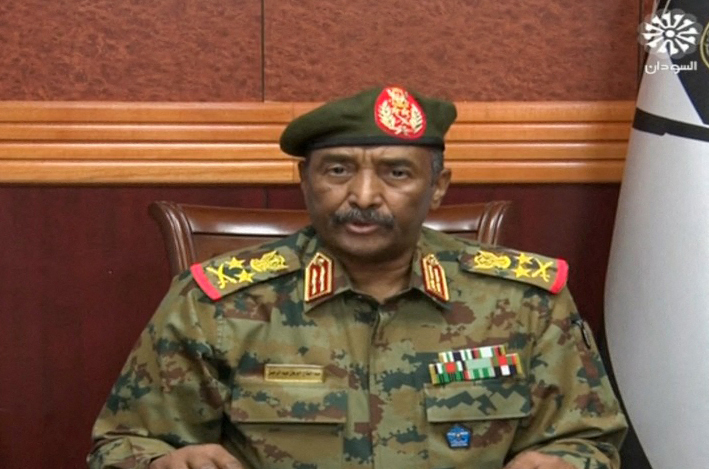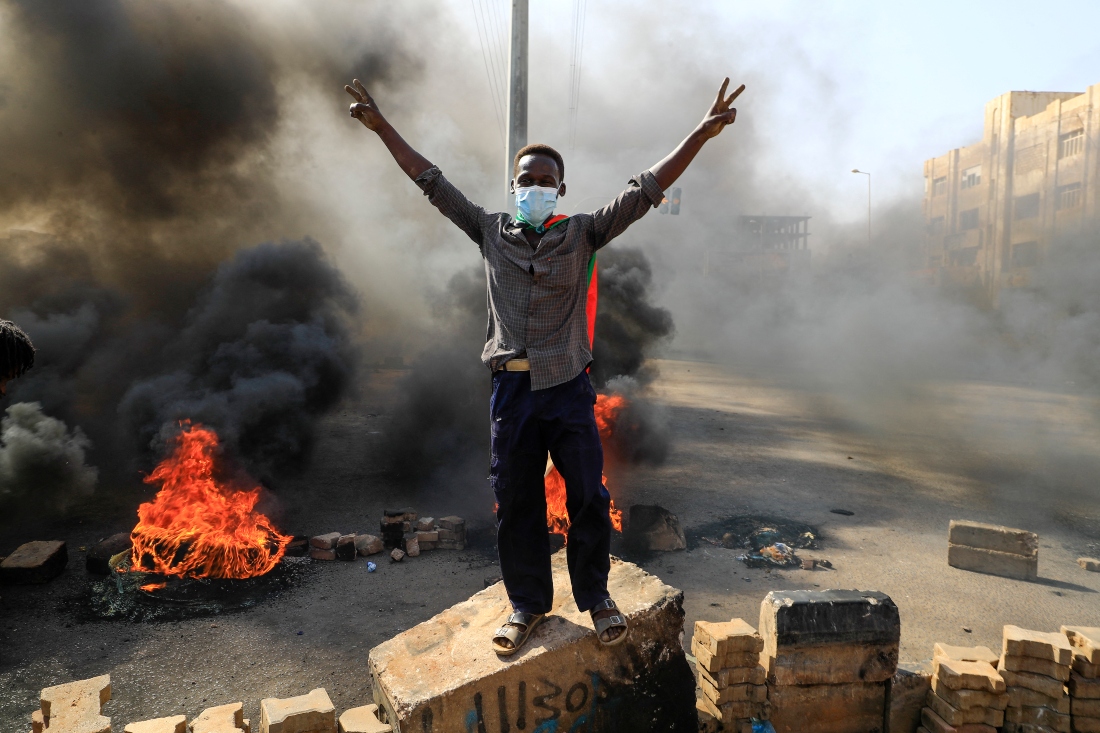RIYADH/KHARTOUM/CAIRO: Gen. Abdel Fattah Al-Burhan, the head of the Sovereign Council, on Monday declared a state of emergency in Sudan and announced the dissolution of the Sovereign Council and the transitional government following a military coup.
In a televised address, Burhan said the ongoing struggle between the transition partners was threatening the country’s safety and security and that the military needed to step in to protect it.
The military will continue with the democratic transition until the handover to a civilian-elected government once elections are held in July 2023, Burhan said.
But the Sudanese Forces of Freedom and Change Alliance said it was calling for “total civil disobedience” in response to the declaration of a state of emergency.
The alliance is a coalition of civilian and rebel coalitions within the country, that was created in January 2019 during the 2018–19 protests.
Several people were earlier reported injured during clashes outside the Sudanese army headquarters after large crowds took to the streets on Monday to protest against a military coup deposing the government of Prime Minister Abdalla Hamdok.

Army General Abdel Fattah al-Burhan addressed the Sudanese people on Oct. 25, 2021, declaring a nationwide state of emergency. (AFP)
The coup comes despite an earlier agreement Hamdok reached with the head of the country’s ruling council, Abdel Fattah Al-Burhan, in the presence of US special envoy Jeffrey Feltman, Adam Harik told the Dubai-based channel.
Sudan’s information ministry said joint military forces detained civilian members of the country’s ruling body and a number of ministers within the transitional government.
“Civilian members of the transitional sovereign council and a number of ministers from the transitional government have been detained by joint military forces,” the ministry said in a statement on Facebook. “They have been led to an unidentified location.”
The ministry also said that the transitional constitution gives only the prime minister the right to declare state of emergency and that the military’s actions are a crime.
The ministry added, on its Facebook page, that Hamdok’s government is still the legitimate transitional authority.
The ministry said the government welcomed the positions taken by the UN Secretary-General, the African Union, and the Arab League, lauding what it described as their rejection of a military coup.
The military action has also sparked international concern, the Arab League warned against any measures that might shake stability in Sudan, TV news channel Al-Arabiya reported.
Sudan’s political leaders should be released and human rights respected, the African Union Commission chairperson Moussa Faki Mahamat said in a statement on Monday.
Thousands marched on Khartoum as the military coup took a hold of power.
Faki also added talks should be resumed between the military and the civilian wing of the trasnsitional government.
The head of the PM’s office Harik said they knew the coup would take place six weeks ago.
“The military establishment does not want to fulfill its obligations to hand over power,” he told Al-Arabiya during his phone interview.
Feltman met with Sudanese military and civilian leaders Saturday and Sunday in efforts to resolve a growing dispute.
In a video shared on social media, what appears to be gunshots can be heard as protesters continued their demonstrations.
Sudan’s Stat News website highlighted the meetings with military officials.
International reaction
Calling for calm, Saudi Arabia said it was following developments in Sudan with concern and called for a de-escalation in the current troubles and restraint.
The statement from the Kingdom continued, calling for the political and economic gains in Sudan to be preserved, adding that it continued in its support for the Sudanese people to achieve security and stability.
Volker Perthes, the Special Representative of the Secretary General for Sudan said: “I am deeply concerned about reports of an ongoing coup and attempts to undermine Sudan’s political transition. The reported detentions of the Prime Minister, government officials and politicians are unacceptable.
“I call on the security forces to immediately release those who have been unlawfully detained or placed under house arrest. It is the responsibility of these forces to ensure the security and wellbeing of people in their custody.
“I urge all parties to exercise utmost restraint. All parties must immediately return to dialogue and engage in good faith to restore the constitutional order.”
The US suspended $700 million in aid to Sudan after the military takeover and urged the immediate restoration of a civilian government.
“The civilian-led transitional government should be immediately restored and represents the will of the people,” State Department spokesman Ned Price told reporters.
“In light of these developments, the United States is pausing assistance,” Price said.
He said that the suspension concerned a $700 million package in economic support meant to assist Sudan’s democratic transition.
“We are pausing that full amount,” Price said.
“We are very much standing with the people of Sudan. The people of Sudan have made clear their aspirations for the continuation of transition to democracy and we will continue to support that including, if needed, by holding accountable those responsible for these anti-democratic actions.”
Price said that the US received no prior knowledge of the military’s intention to oust Hamdok and has not been able to make contact with the detained civilian leader.
The British envoy to Sudan voiced Britain’s concern over the arrest of members of the government and the German foreign ministry called for an immediate end to the coup.
Meanwhile a UN official said they were also “deeply concerned” by the ongoing coup.
The US has expressed alarm at reports of a military takeover of the transitional government in Sudan.
On the official Twitter account of the State Department’s Bureau of African Affairs, Feltman warned the military takeover would contravene Sudan’s Constitutional Declaration and put at risk US assistance to the country.
“The US is deeply alarmed at reports of a military take-over of the transitional government,” Feltman said.
“This would contravene the Constitutional Declaration (which outlines the transition) and the democratic aspirations of the Sudanese people,” he said, according to a statement on Twitter.

(AFP)
Sudan’s Prime Minister Abdalla Hamdok has been placed under house arrest and moved to an unidentified location with his wife.
Al Hadath TV earlier reported four cabinet ministers and a member of Sudan’s Sovereign Council were among those arrested.
One of those arrested was Ali Al-Rayh Al-Sanhouri, secretary-general of the Sudanese Baath Party, Al-Sharq reported, quoting unnamed sources.
Multiple high profile arrests made
The report said Council of Sovereignty member Mohammed Al-Jawki was also under arrest, along with Minister of Cabinet Affairs Khaled Omar Yusuf.
Men in military uniform cut off the main roads leading to the capital, and state television was broadcasting patriotic songs.
There was no immediate comment from the military.
The Khartoum airport was shut and international flights were suspended, Al-Arabiya reported.
Thousands protest in #Sudan over military coup.#لا_للانقلاب_العسكري pic.twitter.com/aQ9reSxxQK
— Khudro Manush (@KhudroManush) October 25, 2021
There was no announcement from the Sudanese government on the status of the airport.
Military forces also stormed the Sudanese radio and television headquarters in Omdurman and arrested employees, the information ministry said on its Facebook page.
Reacting to the developments, the Sudanese Professionals’ Association, Sudan’s main pro-democratic political group, called on people to take to the streets to counter an apparent military coup.
The association also said there were Internet and phone signal outages in the country.
Since August 2019, the country has been led by a civilian-military administration tasked with overseeing the transition to full civilian rule.
The main civilian bloc – the Forces for Freedom and Change (FFC) – which led the anti-Bashir protests in 2019, has splintered into two opposing factions.
“The crisis at hand is engineered – and is in the shape of a creeping coup,” mainstream FFC leader Yasser Arman had told the Saturday press conference in Khartoum.
“We renew our confidence in the government, Prime Minister Abdalla Hamdok, and reforming transitional institutions – but without dictations or imposition,” Arman added.
A failed coup attempt in September fractured the country along old lines, pitting more conservative Islamists who want a military government against those who toppled autocratic former ruler Omar Al-Bashir in mass protests. In recent days, both camps have taken to the street in demonstrations.
Last week, several cabinet ministers took part in big protests in several parts of the Khartoum and other cities against the prospect of military rule.
The military head of the Sovereign Council has previously asserted his commitment to the transition.
(With agencies and additional reporting by Ephrem Kossaify)

































